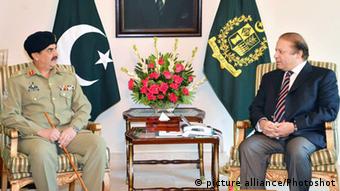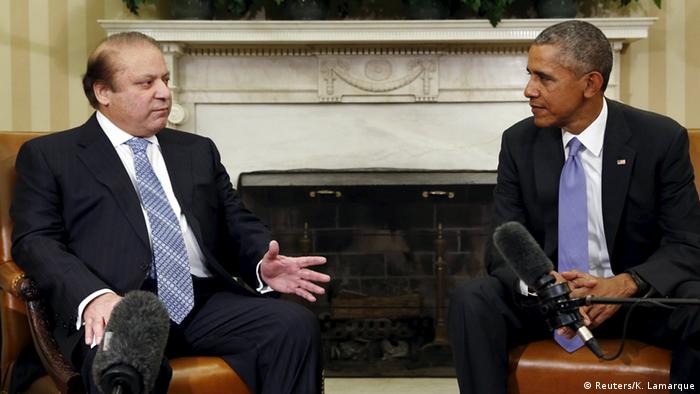BILATERAL RELATIONS
Sharif-Obama meeting and the US' dilemma
US President Barack Obama has lauded Islamabad's terrorism efforts during a meeting with Pakistani PM Nawaz Sharif at the White House. But why does the US continue to give concessions to a dubious partner?
As anticipated, it turned out to be a routine affair at the White House on Thursday, when President Obama held talks with the visiting Pakistani Prime Minister Nawaz Sharif. According to media reports, Sharif apprised the US president of Pakistan's commitment to peace and stability in Afghanistan and of how his country is acting against homegrown terrorist organizations. In return, Obama acknowledged Pakistan's importance in the region and the US' strong ties with the South Asian country.
President Obama also commended the gains made by Pakistan against jihadist networks in its northwestern areas and the sacrifices rendered by its security forces.
"The United States and Pakistan have a long-standing relationship, work and cooperate on a whole host of issues. Not just on security matters, but also on economic and scientific and educational affairs," Obama told reporters before meeting Sharif at the Oval Office. "We're looking forward to using this meeting as an opportunity to further deepen the relationship between the United States and Pakistan."
Sharif said he hoped to "to further strengthen and solidify this relationship."
A joint statement released after the Obama-Sharif meeting said the two leaders discussed a wide range of topics, including strategic stability in South Asia, nuclear security, nonproliferation, Afghanistan, trade and investment.
Afghan peace talks back on agenda
Obama and Sharif urged the Taliban to return to peace talks. They "called on Taliban leaders to enter into direct talks with Kabul and work toward a sustainable peace settlement," according to a joint statement, following their meeting at the White House.
Washington sees Pakistan as a country which enjoys a great deal of influence on the Islamists. The Taliban's new leader Mullah Akhtar Mansour is believed to have close ties with the Pakistani security establishment. Experts say that in the wake of a renewed spike of violence in Afghanistan, Pakistan's role in assisting the Afghan government in reconciliation efforts with the Taliban is vital – a fact that the US understands and acknowledges.
But many security experts say that Pakistan continues to provide military and logistical support to the jihadists in Afghanistan to destabilize President Ashraf Ghani's government. They say that the Taliban's recent surge in northern Afghanistan is proof that they are receiving foreign assistance. Last month, Taliban militants attacked and briefly took over the country's fifth-largest and strategically significant city of Kunduz. Some sources claim that Pakistani jihadists have been fighting along with the insurgents in Kunduz and other northern areas of the war-torn country.
The situation in Afghanistan is so dire that President Obama had to revise his earlier decision of withdrawing all US troops from Afghanistan before 2017. More than 5,000 US soldiers will now stay in the war-torn country to help the Afghan security forces for an indefinite period of time.

US think tanks Carnegie and Stimson Center say Pakistan could have the world's third-largest nuclear stockpile within a decade
Arif Jamal, a US-based journalist and author of books on extremism in Pakistan, believes the US is naïve to expect that Islamabad would stop the use of jihadists as a way to increase its influence in Afghanistan. He also says that the US is not pressuring Pakistani officials enough to make them rethink and revise their Afghanistan policies.
"The carrot alone is not working. The US must use the stick by imposing military and economic sanctions on Pakistan. As long as US aid keeps flowing to Islamabad, there will be no change in policy," he asserted.
Pakistan has received more than $20 billion in civilian and military aid from the US over the past 15 years.
But Pakistani researcher and analyst Farooq Sulehria underlines that even if Sharif has any desire to re-examine Pakistan's involvement in Afghanistan, he is simply powerless to do so: "The US knows the situation. But nothing will change on the ground as the civilians have no control on foreign policy in Pakistan."
Pakistan's nuclear safety
Washington has been worried about the safety of Pakistan's nuclear arsenal. The Obama administration therefore wants to ensure better security of Pakistan's nuclear arsenal and limit their numbers.

Analysts say that Pakistan's military chief Raheel Sharif actually runs the country, not Nawaz Sharif
A recent report by two US think tanks stated that Pakistan could have the world's third-largest nuclear stockpile within a decade.
Published by the Carnegie Endowment for International Peace and the Stimson Center on August 27, the paper concluded that Pakistan could have a nuclear arsenal not only twice the size of neighboring India's but also larger than those of the United Kingdom, China and France.
Pakistan has a history of nuclear proliferation,and despite public statements by US officials that the Islamic country's nuclear weapons are safe, there are growing fears that they could fall into the hands of Islamic terrorists.
But prior to Sharif's meeting with Obama, Pakistani officials said they would not accept limits on its nuclear weapons, given the threat posed by neighboring India.
A joint statement after the White House meeting did refer to the Islamic nation's nuclear security and said both US and Pakistan understood the need for "all sides" to act with restraint and work toward strategic stability in South Asia.
"The Obama administration is surely very worried about Pakistan's nukes. Ideally, President Obama would try to resolve the issue before the next president takes over in January 2017. However, it is unlikely that he could bring Pakistan's nuclear assets under some sort of control," Jamal said.
Status-quo on Indo-Pakistani ties
Another major issue during the White House talks was the increasing tension between Pakistan and India. On Wednesday, Sharif said he had provided "evidence" of Indian-backed terrorist activities inside Pakistan.
The situation is worrisome for the US, which wants Islamabad to focus more on fighting homegrown Islamists than scaling up tension with New Delhi.
"The US has always pressed Pakistan to abandon the use of jihadists as an instrument of foreign policy. It needs to press Islamabad harder though," analyst Jamal said.
The joint statement does mention Washington's concern over military skirmishes along the Indo-Pakistani border, but by no means does it put the blame on India.
Zahid Hussain, a senior Pakistani journalist, told DW that it was a positive sign that Obama acknowledged Pakistan's concerns regarding India's "border violations."
But Islamabad-based journalist Abdul Agha says Obama's acknowledgement of the thorny issues was a routine diplomatic exercise. "The fact is that the US wants a balance on power in South Asia. It shares economic interests with New Delhi and military interests with Islamabad. But it certainly doesn't want to see India and Pakistan going to war. Therefore, it will continue to mediate between the two nations to maintain a status quo." dw de



Comments